Not gonna lie: I was pretty pumped when Dr. Jonathan Rottenberg (Director of the Mood and Emotion Laboratory at the University of South Florida) re-tweeted our post: Awkward: Your Chemical Imbalance is Showing. Wahoo!
A must read? Heck yea! :)
For those of you who missed it, go check it out right now! the lil inforgraphic below sums up everything in a nutshell:
So today I’d like to pick up where we left off by taking a look at antidepressant advertising.
Press rewind…
There is no evidence that depression is caused by a serotonin deficiency. Zilch. That article Dr. Rottenberg mentioned goes into all the details, but in an effort to keep this post kinda sorta short, we’ll let Dr. Joseph Glenmullen (clinical instructor of psychaitry at Harvard Medical School) sum things up:
A serotonin deficiency has not been found.
Boom. There you have it. And yet, commercials for SSRI’s (such as Zoloft, Prozac, Paxil, Lexapro…) are constantly suggesting that antidepressants work by ‘correcting a chemical imbalance in the brain.’
So what gives?
Hey, I love Don Draper as much as the next gal
But if Mad Men has taught us anything (besides the perils of a five-martini lunch) it’s that a drunken skillful advertising campaign can sell salt to a snail.
For years, advertisers have been pushing products that could potentially kill us (hello, cigarettes!) – so can you imagine how much easier it must be to market medication that’s supposed to make us better? (Hello, commission!)
Now here’s the part where I feel compelled to make my standard disclaimer (because it’s no fun diving into the good stuff if everyone’s feeling all defensive!):
You see what just happened there? I felt like I had to defend my position on pharmaceutical drugs – because commercials have conditioned us:
If you don’t believe in antidepressants, then you must not believe in depression.
That $*** is brilliant.
Ten bucks this next part surprises you
The Food and Drug Administration (FDA) does not review and approve drug advertisements before they’re released.
Yep. Ya can’t make this stuff up, folks. According to the FDA:
In most cases, federal law does not allow the FDA to require that drug companies submit ads for approval before the ads can be used. We see many ads at about the same time the public sees them.
And it gets better. According to the FDA’s website:
This means that the public may see ads that violate the law before we can stop the ad from appearing or seek corrections to the ad.
If an ad violates the law, the FDA writes a letter “asking that the ads be stopped right away.” Since 1997, the FDA has sent at least ten warning letters to antidepressant manufacturers – but, intrestingly, none have addressed the misleading suggestion that a serotonin deficiency is to blame for depression. (See: The FDA’s Warning Letters and Notice of Violation to Pharmaceutical Companies.)
As Drs. Jeffrey Lacasse and Jonathan Leo note,
The reasons for their inaction are unclear but seem to result from a deliberate decision at some level of the FDA, rather than oversight.
Tackling the issue head-on, Dr. Lacasse personally contacted the FDA on numerous occassions. His only substantive response? A 2002 email from a regulatory reviewer stating:
Your concern regarding direct-to-consumer advertising raises an interesting issue regarding the validity of reductionistic statements. These statements are used in an attempt to describe the putative mechanisms of neurotransmitter action(s) to the fraction of the public that functions at no higher than a 6th grade reading level.
So these ads are ok because the FDA thinks we’re too dumb to understand the truth?
I don’t mean to lift Lacasse and Leo’s whole article, but I couldn’t have said this next part any better: “Contrary to what the FDA seems to be implying, truth and simplicity are not mutually exclusive.” As the authors point out, the medical textbook, Essential Psychopharmacology, pulls off the task with flying colors, writing:
So far, there is no clear and convincing evidence that monoamine deficiency accounts for depression; that is, there is no ‘real’ monoamine deficit.
Seems pretty simple to me?
Ten more bucks if you’re still reading
So there’s a lot more stuff to get into here (like the whole principle of pushing antidepressants through direct-to-consumer advertising to begin with) but I know that most of you are probably nodding off right about now. So much for keeping today’s post ‘kinda sorta short’, right? :)
But before we go, I just wanted to point out a couple things:
Thirty or forty years ago, the idea that SSRI’s could work by ‘normalizing brain chemicals’ was an exciting concept. However, present-day research has failed to back it up. Sure, the gimmick made for easy marketing – and for a long time scientists held out hope that the theory might still fly. But the reality is: it just didn’t.
Now I get that you’re not going to listen to my little blog – with its silly cartoons and pictures – over your family doctor or fancy commercials. (Ohh, don’t get me started on family doctors prescribing antidepressants!!) But you don’t need to listen to me. Listen to the scientists doing this research. Listen to the experts at the top of their field. It’s only a matter of time before all of this is common knowledge. My goal is to just get that knowledge to you a lil bit quicker ♥
Because depression is real.
And patients need real help.
So why are we wasting our time on ineffective treatments (with a ton of side-effects!) that are just masking the problem? Let’s get serious – and HONEST – about treating depression. Because once all of our cards are on the table, it makes it a whole lot easier to play ;)
If you learned anything from today’s post, I would be super grateful if you’d consider sharing on Facebook, Twitter, etc. I think it’s so incredibly important for this information to get out there ♥
References
Angell, M. (2011 June 23). The Epidemic of Mental Illness: Why? The New York Review of Books. Retrieved: December 7, 2013.
Angell, M. (2011 July 14). The Illusions of Psychiatry. The New York Review of Books. Retrieved: December 7, 2013.
Food and Drug Administration. (2012). Prescription Drug Advertising: Questions and Answers. U.S. Department of Health and Human Services. Accessed: 22 February 2014.
Food and Drug Administration. (2014). Warning Letters and Notice of Violation to Phamaceutical Companies. U.S. Department of Health and Human Services.
Glenmullen, J. (2001). Prozac backlash: Overcoming the dangers of prozac, zoloft, paxil and other antidepressants with safe, effective alternatives. New York: Simon and Shuster. (Page 384)
Kendler, K.S. (2005). Toward a philosophical structure for psychiatry. American Journal of Psychiatry, 162: pp. 433-440.
Lacasse, J.R. & Leo, J. (2005). Serotonin and Depression: A Disconnect between the Advertisements and the Scientific Literature. PLOS Medicine, 12(1): pp. 1211-1216.
Mark, T.L., Levit, K.R. & Buck, J.A. (September 2009). Data-points: psychotropic drug prescriptions by medical speciality. Pyschiatric Services, 60 (9), p. 1167.
National Center for Health Statistics. (2011). Antidepressant Use in Persons Aged 12 and Over: United States, 2005-2008. Centers for Disease Control and Prevention. Retrieved: December 8, 2013.
Stahl, S.M. (2000). Essential psychopharmacology: Neuroscientific basis and practical applications. Cambridge: Cambridge University Press. (Page 601)
Walters, J. (2014). Awkward: Your Chemical Imbalance Is Showing. Prayers and Apples.

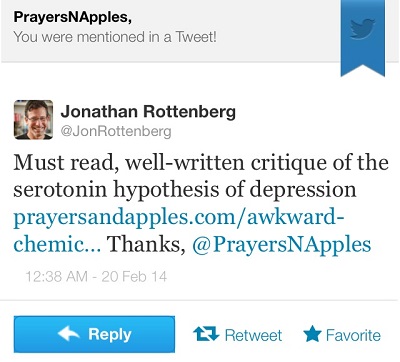
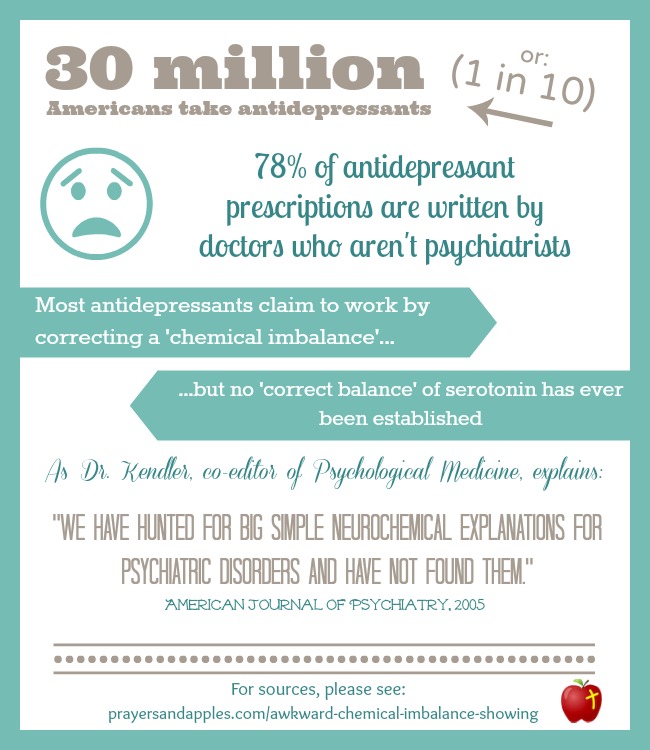
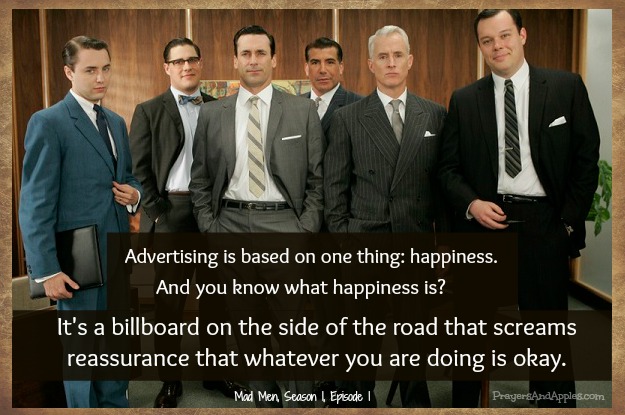
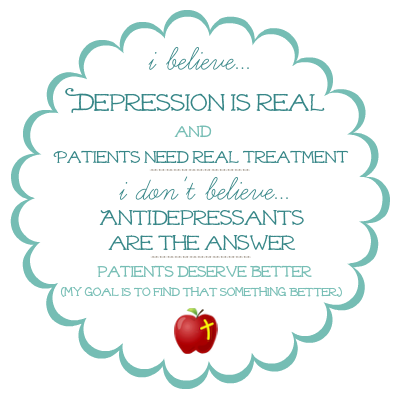

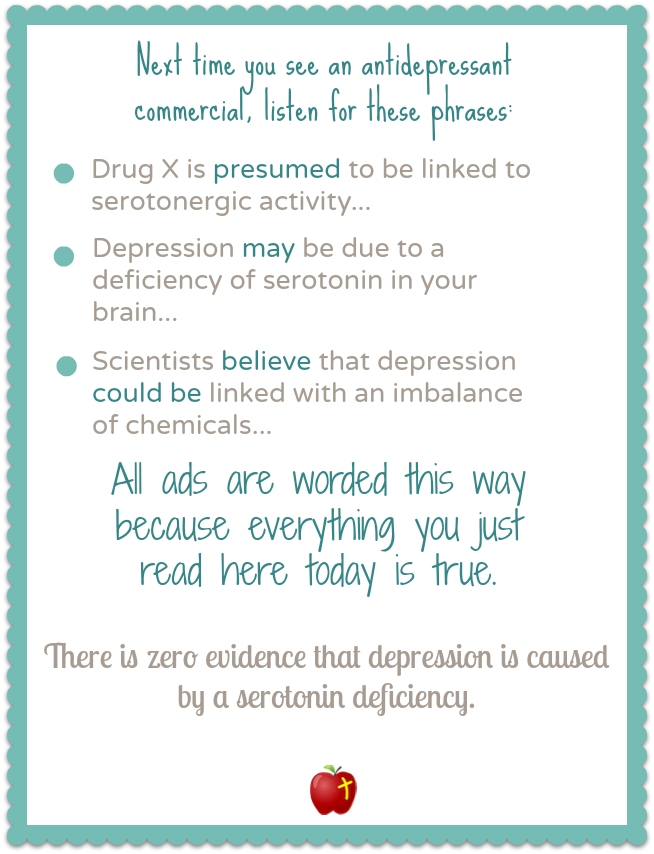


So disappointing to learn how little the FDA does to protect the consumer. Also disappointing to realize the general medical community ignore the science and just continue to flood our neighbors with “drugs”. Great job brining this information to our attention!
Thank you :) Lacasse & Leo also point out that the Irish equivalent of the FDA (the Irish Medical Board) banned an antidepressant company, GlaxoSmithKline, from claiming their drug, paroxetine (Seroxat), ‘corrects a chemical imbalance’. (See: O’Brian 2003 in the research database.) So it’s not like any move by the FDA would be unprecedented. Another great article is: Misleading advertisements for antidepressants in Sweden: A failure of pharmaceutical industry self-regulation (you can access the entire article plus the research was conducted in 2013). The study authors found that 34% of Swedish advertisements breached industry code – and it took, on average, 15 weeks from the date of warning to when the ads were actually taken down.